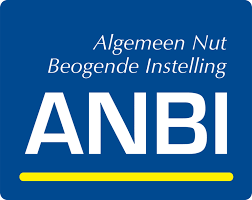| ISG President Prof. Dr. Helianthe Kort |
|
|
|
| Dear ISG members We are looking back to a very successful launch of the project Assistive Technologies for ageing people. The launch is one of the activities described in the working plan that result from the MoU between WHO and ISG on this topic. The launch was held online on February 21 with 48 attendees during the plenary session. The plenary session is recorded and the recording will be available on the ISG website. In the break-out sessions, the pillar leaders introduced their topic and discussed the topic to set the direction of the activities. For those who couldn’t attend the break-out session and who are willing to actively join the project please contact Henk Herman Nap for Pillar I, Espen Aspnes, for Pillar II, and Gloria Gutman for Pillar III. Next to the start to execute the activities as displayed in the work plan of the MoU between WHO and ISG, we also signed an MoU on the same topic with SINTEF. SINTEF is a Norwegian independent research organization in applied research, technology, and innovation “Technology for a better society”. SINTEF will be leading Pillar II on the scope and gaps of assistive technologies for older people with a special focus on Africa. In addition to the launch of the project, the EC managed to finalize the strategic plan 2021-2024. The strategic plan will be presented at the upcoming General Assembly during the 13th world conference in Daegu Korea. To end, I remind you all of the call for a bid to organize the 14th World Conference. The Executive committee is looking forward to receiving your submission on this. Furthermore, in the next quarter of this year, we will further work to facilitate the project on Assistive Living for older people, finalize the financial reports for 2020 and 2021, tidy up the member list and prepare the General Assembly. To end, if you have any questions or ideas for our society, please don’t hesitate to contact us. Wishing you a healthy, and peaceful next quarter. Kind regards,
Helianthe Kort, on behalf of all EC members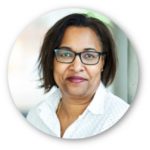 | | |
|
|
|
|
|
| New editorial Board – Gerontechnology Journal |
|
|
|
|
The Gerontechnology Journal, introduction of new associate editors: Dr. Thomas Linner: Professor at the Department of Civil Engineering and the Regensburg School of Digital Sciences at OTH Regensburg (Germany). Dr. Linner’s activities center for close to 20 years on R&D, systems engineering, and innovation management for advanced construction and building technology for future smart and resilient cities – with a special focus on assistive technology and construction robotics. Dr. Linner has authored almost 200 publications, amongst others the Cambridge Handbooks on Construction Robotics series.
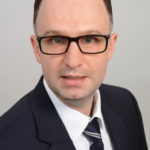
Dr. Jeungok Choi: Associate Professor in the Elaine Marieb College of Nursing at the University of Massachusetts Amherst. Through her entire research career, she has been seeking for ways to improve chronic disease management for older adults from underrepresented backgrounds such as Asian older adults with low-literacy skills. Her approach is to use cognitive behavioral therapy (CBT) to improve long-term adherence to the chronic disease management instructions. Her publications have foci related to web- or mobile-based CBT education, nursing students’ competency, and machine learning/AI.
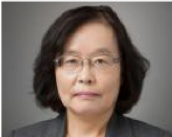
|
|
|
|
| Report of the Launch Event – Collaboration on Assistive Technologies for Healthy Ageing WHO & ISG |
|
|
|
|
The World Health Organization and International Society for Gerontechnology Collaboration on Assistive Technologies for Healthy Ageing – Launch Event, took place, online, on Monday, February 21, 2022 from 2:00 PM to 4:00PM CET.
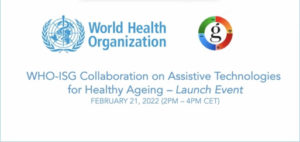
The event focused on presenting a Memorandum of Understanding (MoU) signed by the International Society for Gerontechnology (ISG) and the Division of Medicines and Health Products, of the World Health Organization (WHO) in September 2021, which aims to collaborate in the following areas to progress the World Health Assembly resolution on improving access to assistive technology:
• Promoting the international cultural and scientific exchanges between clinicians, scientists, technologists/engineers and allied professionals on development and use of assistive technologies (including digital assistive technologies) for healthy ageing with a focus on ageing in place based on existing or to-be-developed guiding principles with a global relevance; • Developing assessment criteria/evaluation metrics to assess safety and effectiveness of technology (i.e., acceptability, accessibility, integration and appropriate use) to support active assisted living and ageing in place; • Scoping and categorizing available technologies for ageing-in-place, evaluating existing evidence on their implementation and use, identifying gaps where further research is required with a focus on emerging technologies.
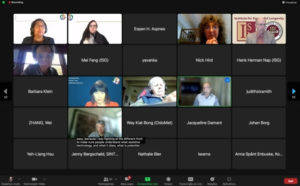
After the Opening Remarks, Mr. Chapal Khasnabis (WHO) and ISG President Helianthe Kort welcomed and gave a brief speech about the importance of the partnership.
Dr. William Kearns, member of ISG Board of Directors, gave an Overview of WHO/ISG MoU. Then the three pillars of the MoU were presented by its leaders: · Pillar I (Dr. Henk Herman Nap): ISG will support WHO in developing assessment criteria/evaluation metrics to assess safety and effectiveness of assistive technology for ageing. · Pillar II (Mr. Espen Aspnes): Scoping and categorizing available assistive technologies for ageing-n-place. Evaluating existing evidence on their implementation and use. Identifying gaps where further research is required and gaps between needs among the elderly and available technologies. · Pillar III (Dr. Gloria Gutman): Promote the international knowledge exchange on development and use of assistive technology for ageing. 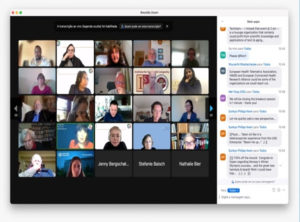
After the presentations, the pillar leaders joined the event participants for a brainstorm in which the main points of each pillar were discussed and presented at the end of the event.
The event was attended by 48 people, including ISG, WHO and SINTEF members and associates. |
|
|
|
| Testimonial on Gerontechnology Lectures in Utrecht |
|
|
|
| After doing two Master’s in international business and healthcare management and having a professional background for more than 10 years, Iattended the Health & Engineering certificate program in Utrecht University of Applied Sciences in 2018. With a very comprehensive program, I had a great opportunity to attend interactive classes, excursions, symposiums, lab, and hospital visits related with the digital healthcare technology. The program was very attractive and extensive, mainly concentrated on the e-health, technology at home and need for special care for elder people. I had the chance to meet with very valuable professors, doctors, researchers, and business partners mainly in digital healthcare technologies. The overall concept of the program was concentrated on the increase in world population, life expectancy and elder population which will shape the future of healthcare. I clearly understood that the world is aging, and new strategies are required to keep the old population healthy and integrate them to society. This was a new horizon and brought a new terminology to my life, which is Gerontechnology as a combination of Geriatrics and Technology. As pandemics brought a new and unforeseen era, I realized that pandemic vulnerabilities of the older population are more apparent than before and there is an urgent action to be taken to face the challenges of the new world underway. By realizing the digital healthcare technologies are great tools to foster the aging population’s requirements, I applied my PhD at Leiden University. Since October 2021, I am doing my research in Leiden University and my research subject aims to set light to the ageing concept by maintaining aging population autonomy with the support of digital assistive technologies. I am very delighted to work on this subject in Leiden University with the guidance of very supportive professors and researchers both in Netherlands and Turkey in the field of healthcare. 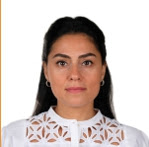 | Duygu Koksal (member of ISG Student Chapter |
|
|
|
|
| ISG Executive Committee Members Meetings |
|
|
|
| Since the launch of our last newsletter (number 5. 2021), four Executive Committee meetings have been held. Among the topics discussed at the meetings, the following stand out: Strategic Plan 2021-2024; WHO & ISG project (Assistive technology and ageing); ISG 2022 – 13th World Conference of Gerontechnology. |
|
|
|
| NORTH AMERICAN CHAPTER On March 24, members of the North American Chapter will participate in the International Collaboration Digital Transformation Healthy Aging (IDIH) Week 2022. At this day the event will be dedicated to address Digital Health for Active and Healthy Aging focusing on the three areas suggested by the IDIH Experts for enhancing international cooperation in the field: Data Governance, Digital Inclusion, Interoperability-by-design. The ISG members will make the following speeches: · Gloria Gutman (President of the North American Chapter International Society for Gerontechnology): The International Society for Gerontechnology. Its mission and activities. · Andrew Sixsmith (Associate Scientific Director, AGE-WELL Network of Centres of Excellence and IDIH Expert): AGE-WELL Network: Making Canada a world leader in technologies that help aging population. · Neil Charness (Chase Professor of Psychology, Florida State University and Director, Institute for Successful Longevity): Frameworks for technology design and technology interventions: Application to social connectivity. · William Kearns (Associate Professor (Retired Meritorious) – Department of Rehabilitation and Mental Health Counseling, University of South Florida): Multi-modal and longitudinal studies towards a shared understanding of the determinants of healthy ageing. For more information, click here to access IDIH Week 2022 website.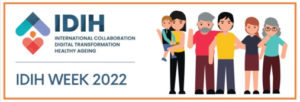 HONG KONG GREAT BAY AREA CHAPTER The Research Institute for Smart Ageing (RISA) of The Hong Kong Polytechnic University (PolyU) was established in late 2021 (http://www.polyu.edu.hk/risa). There were over 30 founding members, coming from 15 different departments with various academic background. Professor Yongping Zheng, the President of ISG Guangdong Hong Kong Macau Greater Bay Area Chapter is the Founding Director for RISA. The establishment of RISA aims to encourage and facilitate inter-disciplinary research among colleagues working in ageing related areas. There are 5 key research directions of RISA, including smart health, smart intelligence, smart environment, smart society, and Gerontechnology. Ageing population is a key topic in Hong Kong and ageing in community is one of its strategies. RISA plans to conduct more community-based research works, including the establishment of RISA ageing data registry system (ADRES) to capture and analyze different data related to Hong Kong elders in a longitudinal way. With RISA’s investment and development in new invention, advanced technology, community-based research, interdisciplinary collaborations with experts in Hong Kong and beyond, we believe it will positive contributions to tackle challenges induced by ageing population. Earlier, PolyU has already established Jockey Club Smart Ageing Hub, focusing on Gerontechnology development and promotion (https://www.polyu.edu.hk/Ageing/en/index.php). KOREAN CHAPTER Yeong-Ran Park, President of the ISG Korean Chapter, and the Chair of the Organizing Committee for the 13th World Conference on Gerontechnology is invited to the IAGG 2022: 22nd World Congress of Gerontology and Geriatrics (Jun 12-16, 2022) as a keynote speaker. Dr. Park will deliver a presentation on the topic of “Gerontechnology for all in the era of digital transformation.” For more information, click here. ISG STUDENT CHAPTER ISG Student Chapter keeps working on one of the key subjects of the International Society on Gerontechnology: sharing synergies between the Gerontechnology and PhD students. Incoming research works are the base for the future solutions. Thus, these new lines require a space for older adults. For this, the ISG Student Chapter is putting efforts in promoting older-adult-friendly designs among the PhD works, achieving an incoming popularity. The key for a future is guaranteeing comfort and applicability for everyone. With this idea on mind, the ISG Student Chapter is working every day on contributing for a better world from the very beginning of science. |
|
|
|
| Brazilian Chapter new president elected and new board |
|
|
|
| The Brazilian chapter had, in January of this year, the election of the new president and board. For 4 years, Prof. Carla da Silva Santana Castro, was president of the Brazilian Society of Gerontechnology, since its foundation in September 2017. Four years in which SBGTEC achieved the series of achievements: three national conferences with international speakers, chapter registration in the International Society of Gerontechnology and active participation in the ISG, seminars, YouTube channel and other social media, courses, political visibility and scientific research and establishing relationships with partners in the field of aging. The new president is Prof. Dr. Paula Costa Castro, professor at the Federal University of Sao Carlos. 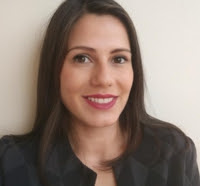
The new board is planning for the next two years to consolidate the initiatives already underway, strengthen the organizational and financial structure, advance in the internationalization process and develop new proposals to continue the dissemination and development of Gerontechnology in Brazil. |
|
|
|
| ISG 2022 – 13th ISG World Conference – Daegu, Korea |
|
|
|
| SAVE THE DATE 13th ISG World Conference
October 24-26, 2022
Daegu, Korea Theme: Gerontechnology in the Era of Artificial Intelligence
Venue: EXCO
Address: 10 Exco-ro, Buk-gu, Daegu 41515, Korea CALL FOR ABSTRACTS Deadline: March 31, 2022 Categories:
1. Housing and daily living
2. Mobility and transport
3. Physical and mental health
4. Information and communication
5. Work and social participation
6. Governance and social policy
7. Others not covered by the listed categories More information: https://isg2022.org/kr/abstract
Keep close watch on the ISG2022 official website: http://isg2022.org/kr/index |
|
|
|
| Join our ISG Community and stay well informed by joining us on: |
|
|
|
If you are not yet a member of the International Society for Gerontechnology and would like to join a dynamic community of professionals dedicated to creating advanced technologies to support living well to a great age, then click here. By becoming an ISG member you automatically get full access to the latest research published in our international journal, Gerontechnology, and you will realize significant savings when you register to attend our ISG World Conferences held around the globe. |
|
|
|










